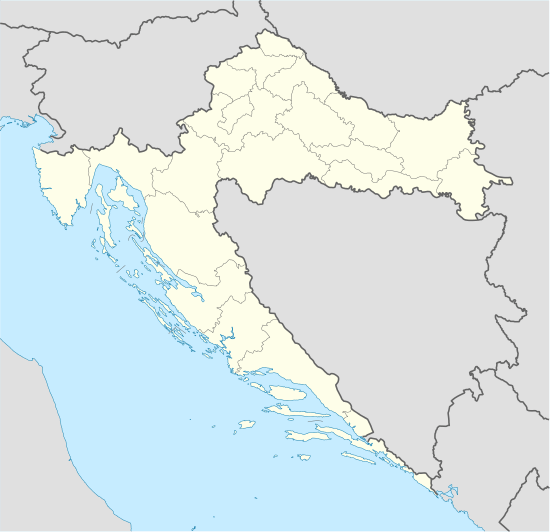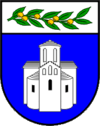Srb
| Srb Срб (Serbian)[1] | |
|---|---|
| Village | |
|
monument of Srb uprising | |
 Srb | |
| Coordinates: HR 44°22′17″N 16°07′32″E / 44.371355°N 16.125526°E | |
| Country |
|
| County | Zadar County |
| Municipality | Gračac |
| Population (2011)[2] | |
| • Total | 472 |
| Time zone | CET (UTC+1) |
| • Summer (DST) | CEST (UTC+2) |
Srb (Serbian Cyrillic: Срб[1]) is a village located in the southeastern part of Lika, in Croatia, administratively divided into Donji Srb (44°22′17″N 16°07′32″E / 44.371355°N 16.125526°E, population 255, census 2001) and Gornji Srb (44°21′18″N 16°07′14″E / 44.354941°N 16.120462°E, population 79, census 2001).[3] Srb lies in the Una River valley, on the road from Donji Lapac to Knin, and is east of Gračac. It is currently part of the Gračac municipality and the Zadar County.
Name
According to Croat academic Petar Šimunović, etymology is that Srb is derived from the old Croatian verb "serbati" and denoting the spring of the river Una.[4] Because Serbs (Sorabos) are mentioned in the Royal Frankish Annals in the context of Ljudevit Posavski, there is a theory that a Serb tribe could have existed in the area of Srb at some point in the 9th century, and that Srb was named after them, but the scarcity of historical records made various historians differ in the interpretations of this mention.[5]
History
Srb is mentioned in the 14th century as a town of the Kingdom of Croatia. Some documents from the year 1345 mention it belonged to the Hungary-Croatian king as a royal fortress-citadel, Latin: castra nostra Regalia, videlicet Tininium .. .. Szereb castrum castrum Unach vocata cum Corum supatibus et pertinensiis. This town was built on a hill high above the stream Sredice, where its remains still stand today.
After the World War II invasion of Yugoslavia, Srb became part of the fascist Independent State of Croatia. On July 27, 1941, an uprising started in Srb organized by the local Serb population, the Srb uprising. The organizers, including the Lapac squad commander Stojan Matić, weren't all communist Partisans, and their immediate reprisals against the Ustaše also ended with random Croat and Muslim victims, which Marko Orešković later intervened against. The date was nevertheless later commemorated in SR Croatia (1945–1990) as the Day of the Uprising of the Peoples of Croatia (Croatian: Dan ustanka naroda Hrvatske).[6]
On July 25, 1990 an assembly of approximately 100,000 Croatian Serbs was held in Srb.[7] A declaration was released which established a Serbian Assembly, with its seat in Srb, as the political representative of the Serbian nation in Croatia, and the Serbian National Council as the executive body of the Assembly.[7] Croatian Serb politician Jovan Rašković announced that a referendum would be held within the Serb community on August 18.[8]
Demographic history
- In the 1991 census, when Srb was part of the Donji Lapac municipality, it had a population of 5,254.
- 5,246 Serbs
- 8 Other.
References
- 1 2 Government of Croatia (October 2013). "Peto izvješće Republike Hrvatske o primjeni Europske povelje o regionalnim ili manjinskim jezicima" (PDF) (in Croatian). Council of Europe. p. 36. Retrieved 30 November 2016.
- ↑ "Population by Age and Sex, by Settlements, 2011 Census: Srb". Census of Population, Households and Dwellings 2011. Zagreb: Croatian Bureau of Statistics. December 2012.
- ↑ "Gračac municipality data" (in Croatian). Croatian State Statistics Office. 2001. Retrieved 2010-08-11.
- ↑ Darko Žubrinić (2005). "The earliest Croatian Princes and Kings". Croatia - historical and cultural overview. Retrieved 2011-02-09.
In an interview on Fokus (30 September 2005), Croat academic Petar Simunovic explained that the name of Srb originates from an old Croatian verb serbati, srebati meaning "to sip", from which the noun "srb" has been derived. Thus "srb" denotes the spring of river Una, where the village lies. Compare this with the villages of Srbani (near Pula), and Srbinjak, both in Istria, which clearly have nothing to do with the Serbian name. The Istarski razvod from 13th century mentions the name of srbar, meaning a water spring.
- ↑ Goldstein, Ivo (May 1985). "Ponovno o Srbima u Hrvatskoj u 9. stoljeću" (PDF). Historijski zbornik (in Croatian). Savez povijesnih društava Hrvatske, Faculty of Philosophy, Zagreb. XXXVII (1): 243–244. Retrieved 2012-07-27.
- ↑ Tvrtko Jakovina (2010-07-27). "Ustanak u Srbu: što se dogodilo 27. srpnja 1941.?". Jutarnji list (in Croatian). Retrieved 2010-08-11.
- 1 2 "Case No. IT-03-72-I: The Prosecutor v. Milan Babić" (PDF). International Criminal Tribunal for the Former Yugoslavia. Retrieved 2010-08-13.
In response to the fear of becoming a discriminated against minority in Croatia, on 25 July 1990, Milan BABIC and other SDS Krajina leaders participated in a Serbian assembly in Srb, attended by approximately one hundred thousand Croatian Serbs. The Assembly passed a Declaration "on the Sovereignty and Autonomy of the Serbian Nation" in Croatia.
- ↑ Paul Roe, Ethnic violence and the societal security dilemma . Routledge, 2005. (p. 94)
